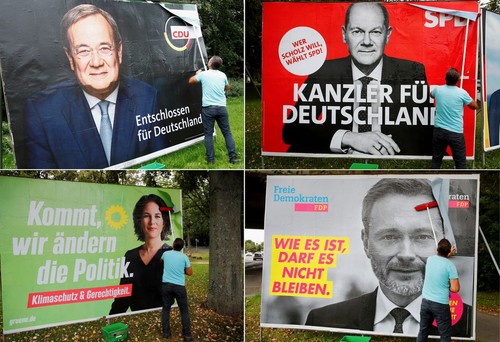 A combination of four images shows placards of Germany’s top candidates for the September 26 German general elections being placed on large boards. The top row shows Armin Laschet of the Christian Democratic Union Party CDU and Olaf Scholz of Germany’s Social Democratic Party SPD. The bottom row shows Greens Party candidate Annalena Baerbock and Christian Lindner of the Free Democratic Party FDP, in Bonn, Germany, September 20, 2021. (Photo: REUTERS) A combination of four images shows placards of Germany’s top candidates for the September 26 German general elections being placed on large boards. The top row shows Armin Laschet of the Christian Democratic Union Party CDU and Olaf Scholz of Germany’s Social Democratic Party SPD. The bottom row shows Greens Party candidate Annalena Baerbock and Christian Lindner of the Free Democratic Party FDP, in Bonn, Germany, September 20, 2021. (Photo: REUTERS) |
Merkel has been in power since 2005 but plans to step down after the election, making the vote an era-changing event to set the future course of Europe's largest economy.
A fractured electorate means that after the election, leading parties will sound each other out before embarking on more formal coalition negotiations that could take months, leaving Merkel in charge in a caretaker role.
Conservative candidate Armin Laschet said on Saturday that a leftist alliance led by the SPD with the Greens and the hard-left Linke party would destabilise Europe.
Running against Laschet is Olaf Scholz of the SPD, the finance minister in Merkel's right-left coalition who won all three televised debates between the leading candidates.
The splintered political landscape means a three-way coalition is likely. Final opinion polls gave the Social Democrats a narrow lead, but the conservatives have reduced the gap in recent days and many voters were still undecided.
The most likely coalition scenarios see either the SPD or the conservative CDU/CSU bloc - whoever comes first - forming an alliance with the Greens and the liberal Free Democrats (FDP).